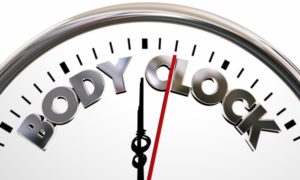Planning Your Daily Clock Around Your Body Clock
Are you aware of how your ‘daily clock’ i.e., the things you do every day, at certain times of the day, are affected by your body clock, or that you could plan your day more effectively when you listen to your body clock. At LifeFone, we have some secrets that can help you take advantage of your own body’s clock.

Many people associate the circadian rhythm (body clock) as the root of jet lag but did you know it also controls most plants and animals’ day-night cycle? This rhythm is largely controlled by the hormones serotonin — which controls the day cycle — and melatonin which controls the night cycle.
Wake Up
The best time to wake up is after you’ve achieved seven to eight hours of sleep. Your body needs approximately five complete cycles of sleep to achieve a proper, restful state. A single sleep cycle takes the average person 90 minutes.
Don’t forget your sleep hygiene; cool and dark rooms create the best environment to get the perfect night’s sleep.
Breakfast
Have your breakfast within an hour of waking up. It’s all about the glycemic index – making sure your body’s insulin doesn’t peak or drop off too quickly.
Exercise
The best time to exercise is within an hour after having your breakfast. Apart from serotonin and melatonin, the circadian rhythm also controls cortisol levels, which is highest in the morning. Cortisol is a hormone that can aid in the metabolism of fat, protein and carbohydrates. Of course, if your day doesn’t allow for morning exercise, any time of the day is better than no exercise at all.
Brainstorming
The best time to brainstorm is before noon, or your lunch. Your body clock – i.e., circadian rhythm controls certain neurohormones – like dopamine and beta-phenylethylamine (PEA) – that keeps us alert because they control blood vessels which stimulate oxygen flow to the brain. After lunch, your body becomes tired from digesting the food.
Heart Attack
Of course, there is never a good time to have a heart attack, but, interestingly, the most common time is Monday morning. Why? In the morning, blood pressure tends to spike an hour after you wake up, and studies show more heart attacks occur on Mondays than any other day of the week. The body is more vulnerable to heart attacks on Monday because often times we over indulge on weekends. Our eating, and drinking habits are typically different on the weekend than throughout the week. The mixture of higher blood pressure, heading back to work if you aren’t retired, and excess indulgences can take a toll on your health.
Napping
If your body needs it, and your schedule allows, take a nap. The best time is in the mid-afternoon, but no longer than 20 minutes. These short naps are sometimes referred to as ‘power naps’. Any longer than that and you enter into a deep sleep phase, and waking up abruptly from that descent will make you groggy.
Eating
When it comes to eating, smaller meals, spread out across the day are better than big meals. This helps to maintain good blood sugar levels. It’s also smart to eat a larger lunch than supper. This gives your body the time to metabolize the food and sustains your energy levels. Don’t leave out snacks, especially between lunch and supper.
At LifeFone, we believe when you create healthy lifestyle choices, and listen to your body, you run a less chance of enduring accidents in your home. For the times when you might require immediate medical assistance, having a medical alert device will give you the assurance that help is on the way at a touch of a button.
- How Seniors Can Feel Empowered in a Digital World with Accessible Technology
- February Is American Heart Month
- Thriving as a New Caregiver: Self-Care Secrets Revealed
- Bridging the Gap: Supporting Seniors Without Nearby Family
- Distance Caregiving Simplified: Modern Strategies for Compassionate Support
FREE BROCHURE Today!
